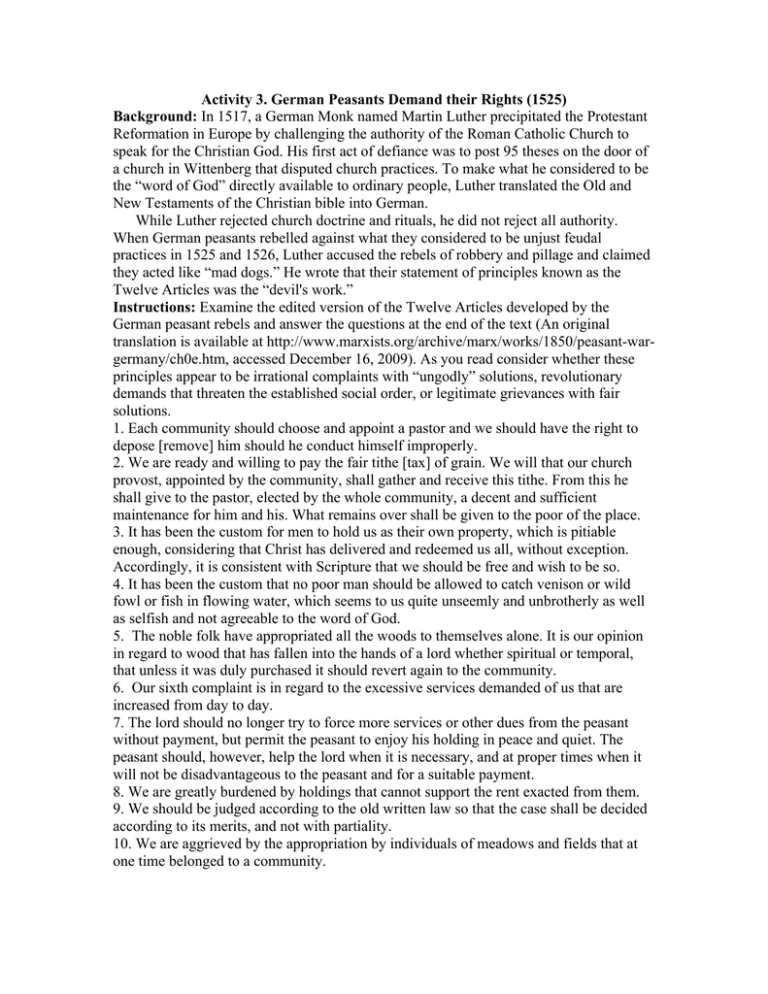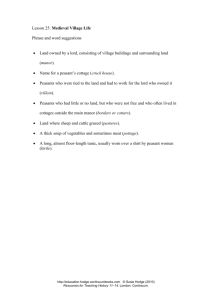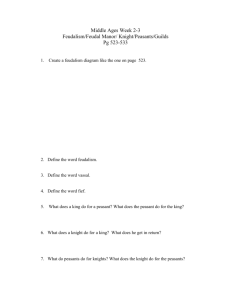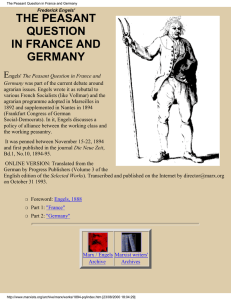Activity 3. German Peasants Demand their Rights (1525) Background:
advertisement

Activity 3. German Peasants Demand their Rights (1525) Background: In 1517, a German Monk named Martin Luther precipitated the Protestant Reformation in Europe by challenging the authority of the Roman Catholic Church to speak for the Christian God. His first act of defiance was to post 95 theses on the door of a church in Wittenberg that disputed church practices. To make what he considered to be the “word of God” directly available to ordinary people, Luther translated the Old and New Testaments of the Christian bible into German. While Luther rejected church doctrine and rituals, he did not reject all authority. When German peasants rebelled against what they considered to be unjust feudal practices in 1525 and 1526, Luther accused the rebels of robbery and pillage and claimed they acted like “mad dogs.” He wrote that their statement of principles known as the Twelve Articles was the “devil's work.” Instructions: Examine the edited version of the Twelve Articles developed by the German peasant rebels and answer the questions at the end of the text (An original translation is available at http://www.marxists.org/archive/marx/works/1850/peasant-wargermany/ch0e.htm, accessed December 16, 2009). As you read consider whether these principles appear to be irrational complaints with “ungodly” solutions, revolutionary demands that threaten the established social order, or legitimate grievances with fair solutions. 1. Each community should choose and appoint a pastor and we should have the right to depose [remove] him should he conduct himself improperly. 2. We are ready and willing to pay the fair tithe [tax] of grain. We will that our church provost, appointed by the community, shall gather and receive this tithe. From this he shall give to the pastor, elected by the whole community, a decent and sufficient maintenance for him and his. What remains over shall be given to the poor of the place. 3. It has been the custom for men to hold us as their own property, which is pitiable enough, considering that Christ has delivered and redeemed us all, without exception. Accordingly, it is consistent with Scripture that we should be free and wish to be so. 4. It has been the custom that no poor man should be allowed to catch venison or wild fowl or fish in flowing water, which seems to us quite unseemly and unbrotherly as well as selfish and not agreeable to the word of God. 5. The noble folk have appropriated all the woods to themselves alone. It is our opinion in regard to wood that has fallen into the hands of a lord whether spiritual or temporal, that unless it was duly purchased it should revert again to the community. 6. Our sixth complaint is in regard to the excessive services demanded of us that are increased from day to day. 7. The lord should no longer try to force more services or other dues from the peasant without payment, but permit the peasant to enjoy his holding in peace and quiet. The peasant should, however, help the lord when it is necessary, and at proper times when it will not be disadvantageous to the peasant and for a suitable payment. 8. We are greatly burdened by holdings that cannot support the rent exacted from them. 9. We should be judged according to the old written law so that the case shall be decided according to its merits, and not with partiality. 10. We are aggrieved by the appropriation by individuals of meadows and fields that at one time belonged to a community. 11. We will entirely abolish the Todfall [inheritance tax] and will no longer endure it, nor allow widows and orphans to be thus shamefully robbed against God's will. 12. If any one or more of the articles here set forth should not be in agreement with the word of God, as we think they are, such article we will willingly recede [remove] from when it is proved really to be against the word of God by a clear explanation of the Scripture. Questions 1. What is the first demand of the peasant rebels? 2. What are some of their other grievances? 3. How does the document try to secure the support of those in authority? 4. In your opinion, what is the general tone of these statements? 5. In your opinion, why were social class conflicts during this period expressed in religious terms? Follow-up Discussion: In your opinion, should the Twelve Articles be considered a precursor of the American Declaration of Independence and Bill of Rights?



